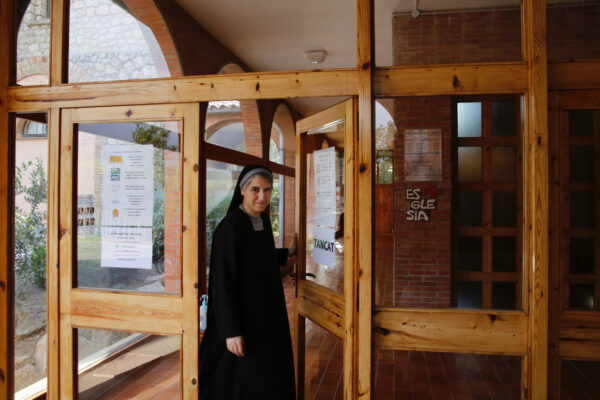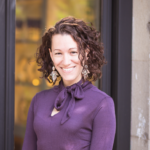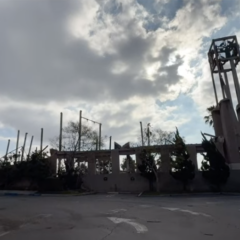This article was originally published by Religion Unplugged, with the support of CRCC’s global project on engaged spirituality.
Catholic nun and medical doctor Teresa Forcades says women should make their own abortion decisions.
The Catholic Church’s creed, per Pope Francis, states that “abortion is murder. Those who carry out abortions kill.”
Sister Forcades’ take: “I don’t believe the state can impose an absolute ban on abortion. The fetus or the embryo, it’s a very particular form of life because it’s within another. It’s within a mother who has to be able to make decisions in her life as a full human being.”
Forcades is quick to clarify that she is not “pro-choice” and that she, too, believes in the sanctity of life, but the situation is “way more complex” to squeeze into the pro-choice/pro-life binary that frames today’s abortion debate.
Routinely called Europe’s most radical and vocal nun, Forcades is known for her public opposition to the Catholic church’s doctrine on women’s ordination, same-sex unions and abortion as well as her vaccine skepticism.
The Catalan nun straddles the fields of public health and theology. At age 29, she earned a medical degree from the University at Buffalo School of Medicine, serving her residency for three years at such hospitals as Buffalo General Hospital, Erie County Medical Center and Roswell Park Cancer Institute. In 1995, when studying for her medical boards at the Monastery of Saint Benedict of Montserrat in her native Catalonia, Spain, something shifted in her. “I saw the nuns exiting the chapel, the church, and I became conscious of a desire in me,” she said. “I knew it had been there lurking or building, but now it became visible inwards.” Forcades went on to earn a master of divinity from Harvard Divinity School and years later become a Benedictine nun at that same monastery.
Her foray into the public abortion debate was eventful. In 2009, Forcades said on the Spanish television program “Singular” that all women should have the “morning after” pill in their purses. Fortified by her former career as a U.S.-based medical doctor, she clarified, “The medicine makes it highly improbable for conception to occur.” Christian fundamentalist news sites, tone-deaf to the complexity of her argument, slung headlines like “The Abortion Nun” and “The Nun of the Devil.”
“I could not breathe normally when I read this,” Forcades said. Soon after, the Vatican sent a letter urging the Catalan nun to publicly retract her views and suggesting she be disciplined. Undaunted, Forcades instead replied with a rigorous theological case for abortion rights that, she argued, was “compatible with the gospel” and “defendable within the church.”
More than a decade since, the Vatican has not responded. Forcades remains an active Benedictine nun today, regularly broadcasting her convictions and bracing for the debate and, at times, vilification that follows.
ReligionUnplugged.com spoke to Forcades last summer from the Monastery of Saint Benedict of Montserrat, her home just outside of Barcelona, Spain. There she runs the Sinclètica Monastic School’s multidisciplinary graduate degree program. In the interview, Forcades disinvited the church from a woman’s womb, but did so by drawing from the tradition of theological and philosophical inquiry rather than pitting the “the sanctity of life” against “personal choice.” Instead, she posed a broader, philosophical question for religious circles: Is a mother’s life more or less valuable than the child who relies on her for survival?
This interview has been edited for brevity and clarity.
Religion Unplugged: What did the 2009 letter you received say, and what did you write to the Vatican about abortion?
Sister Teresa Forcades: When this letter came from Rome in 2009, I had no clue what it meant and what the consequences could be. I was in Berlin then, and I was studying there. The abbess called me and asked me about it. “We have received this, what do you want to do?”
I thought, well, Rome is asking that I do a retractatio (retraction), which means you take back what you said and you write a public letter. They were also advising the others (nuns) to discipline me. And they requested that I write a public letter where I said, “I made a mistake. I take it back.”
The abbess asked me, “What do you want to do?” I answered, “What do you mean by that? Is it an option to say something I don’t believe in? How can I write a letter that says, ‘Oh, I think otherwise’? That would be lying, right? You cannot ask that from me. The church cannot ask that. It makes no sense.”
She didn’t push me. She said, “Okay, but what do you want to write, then?” I replied, “Let me think about it.”
I thought I needed to express my thinking in a way that (the Vatican) understands because they might think I am pro-choice in the sense that I would just dispose of life without further ado. This is not what I’m saying. I’m saying, precisely, that there is a problem and it is huge. You have two fundamental principles at play: the dignity of a human being that cannot be instrumentalized and the sanctity of life. What happens when those two conflict?
The example I gave to the church for their consideration was that of the father of a child and that child needs a kidney transplant. This is not an imagined example. I drew from an experience I had in 2009 with a Jesuit who needed a kidney transplant. He very happily told me that 11 of his brothers had gone to check whether they were compatible to give him the kidney. But I thought, how come only 11? There were 200 Jesuits? How come only 11 offered to save his life?
In my example, it’s a father that has a child, and the child needs a kidney transplant to survive. My question is, Is the church ready to force the father under punishment of imprisonment, or excommunication, to give the kidney to the child? The answer: The church is not.
The Catholic Church may say to the father that it’s advisable that you donate the kidney. But it will not make the father feel that the whole rage of God is going to fall upon him if he does not offer a little bit of his body to save the life of his child. No, it’s not doing it.
It’s not doing it for a reason, because if you go this way, you open the way to the instrumentalization of the human being and could end up justifying all kinds of abuses, like sacrificing one person for the sake of saving a few others by distributing that person’s organs — the lungs, both kidneys, the heart. So the answer is no, the church does not force a father under threat of excommunication, and yet the danger to the father’s life of giving a kidney to his son or daughter is much less than the danger of a woman in certain circumstances to carry a pregnancy. She might be risking her life.
There was a 9-year-old child in Brazil, for example, that was pregnant after her stepfather raped her. The doctor said this girl is going to die or be heavily injured for life, to carry out the pregnancy at age 9. And so they did the abortion with the agreement of the mother. But some in the church believed that this shouldn’t have gone on and excommunicated the doctors and the mother. Not the stepfather. Here you are risking the life of the raped child because of the principle of the sanctity applied to the life she carries in her womb. But you won’t ask the father to donate a kidney.
So what I did is to write a letter with these points and publish it. It was not a retraction, but a clarification. The answer went to Rome, and I have not heard a reply to this day. I believe that my answer was accompanied by a letter from the abbess that said, “That’s how this nun thinks. This is not how I think, but I cannot say she’s been against discipline because she’s a nun who has always done whatever we’ve asked her.”
So the abbess was separating herself, but not saying anything bad about me. The bishop also said, I don’t agree with what you say, but that’s what you are expressing. So, on receiving that, the congregation of the religious people could not do anything because it was not a matter of me being undisciplined, it was a matter of ethical thinking or theological thinking or content. The case was passed on to the congregation for the doctrine of the faith.
I will add, before I sent the letter, I sought out the expert advice of somebody who could help me see the weaknesses of my position. I contacted Johannes Reiter, who is a German theologian and ethicist who happened to be a member of the Pontifical International Theological Commission, which is the commission of theologians who advises the commission on the doctrine of the faith. He also told me, “Your argument does not align with mine, but it’s defensible.” So I thought, OK, I will send this as is.
I am convinced to this day that the opinion I sent to the Vatican is a way of thinking compatible with the gospel. I think that it is compatible with the church teachings — not with the letter of some of it, but with the underlying principles. I think that my opinion is defendable within the church and that the church could hold such a position.
RUP: Where do you stand on abortion in general?
Forcades: I believe that life is sacred and needs to be defended from conception to the tomb. I don’t think abortion is a right: If you are a believer in God, life is not in your hands. Life is not something you can just take away from somebody else or from your own child.
There is a sanctity of life. How we, each of us, stand on this has huge consequences on everybody’s life and in society. The relationship with life cannot be one where you have the right to make it shorter or longer. This is very clear from the perspective of a religious believer.
My argument on abortion is one of a lesser evil. I consider it good that the church talks of the sanctity of life in utero. I consider it good that there are shelters and places where women who are in very tough situations find support to deliver the baby even when they cannot take care of her/him. But what is it to do when a woman says, “There is no way I can keep the child. I would like to have it, but I cannot have it and not keep it.” Well, yes you can. If a woman so feels. But you cannot do this alone, and you need a whole support system. And not every woman has it. This is very complex; the church is establishing that type of support and also other agencies. I’m also aware of the huge industry and business of abortion that exists. So this is how complex I see the topic.
RUP: There are 24 countries in the world where abortion is outlawed, according to the Center for Reproductive Rights advocacy group. Consider El Salvador, which even bans abortions in cases of rape and incest, with prison sentences doled out ranging from 2 to 50 years. What is your opinion on a blanket ban on abortion?
Forcades: There have been studies of countries like El Salvador, where the Catholic Church has had its say and has imposed a civil law that says abortion is a crime. You will be punished with prison up to 40 years if you perform an abortion as a doctor. Doctors are so afraid of the punishment that, in order to protect themselves, they denounce women who have spontaneous abortions (or miscarriages) as suspects of having caused the abortions themselves. And these women might end up in jail for many years. It is not so easy to distinguish between spontaneous and induced abortion.
This is why I don’t believe the state can impose an absolute ban on abortion. The fetus or the embryo — it’s a very particular form of life because it’s within another. It’s within a mother who has to be able to make decisions in her life as a full human being. This right to personal freedom, the dignity of the person, is something the church has been defending for centuries — sometimes alone in very difficult contexts.
The human being has dignity. And in the words of the philosopher Immanuel Kant, a human being can never be an instrument for somebody else. You cannot because that’s against your dignity.
The dignity of the human being means it is always an end to itself. It’s never a means for something else. That’s called manipulating people. That’s depersonalizing people. That’s objectifying people. You don’t do that.
Here you have this very particular case of the woman who has and should enjoy all this respect in her dignity, who might find herself in conflict with another life within. The relationship of a pregnant woman and her unborn child is a peculiar and unique situation. It is a mystery, and you better let God and the woman sort it out. Don’t allow the state to mingle with that. That’s my point.
RUP: What has been the response from the Catholic community at large to your opinions about abortion?
Forcades: After I mentioned the morning-after pill on the TV interview, what appeared on some fundamentalist Christian Catholic internet sites was “The abortion nun” and “The Nun of the Devil.” I was shocked.
That’s painful. How can they do this? These people don’t know me. What they are saying, it’s not true. They are assuming what I believe. It was shocking. It was very much like a loss of innocence of sorts because those who were doing this were people who belong to the church.
I, up until then, had had a very positive experience in the church. I could not breathe normally when I read this. My heart would pump. How can that happen? That goes on and with impunity, and nobody stops it. It was physically upsetting.
RUP: Yet you continue to express these views and many other controversial ones, earning you the moniker in political and media circles, “Europe’s most radical nun.” What is your reaction to this?
Forcades: For me, radical is not a negative expression. It’s something that points to our desire to be congruent and not accommodating this.
I don’t think I’m afraid of confrontation. That’s how you sometimes come out with a better solution for all. You acknowledge the difference by confronting it. Not of course in any violent or tricky way but openly. You confront and you say, “No, I don’t think like this.” And somebody else says, “Okay, I do.” And then we see how we can work together.
I think one of the highest human actions or human tasks is politics. That’s what Aristotle would say, that one who only cares about himself has ethics. One who cares about all has politics. Politics is ethics for everybody, not only for you. I don’t want to be only ethical. I want to be political because I think that’s what we are called to do from the gospel.
Click here to read the article on Religion Unplugged
Linda Freund is a journalist fellow with the Spiritual Exemplars Project.





